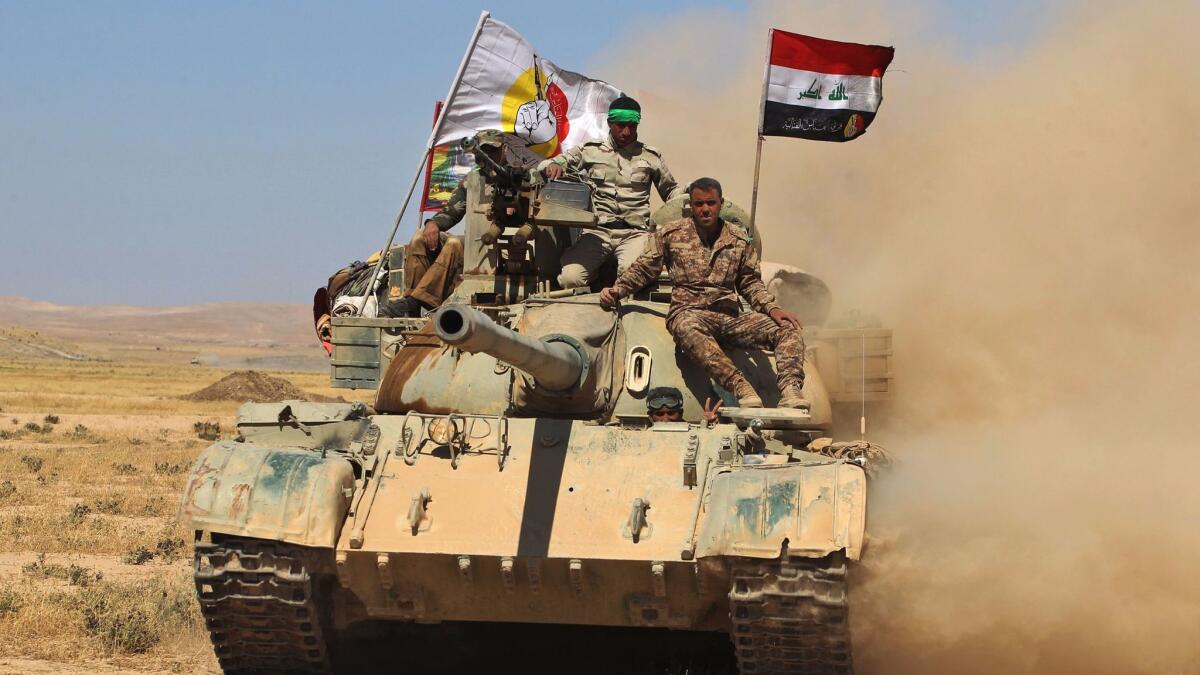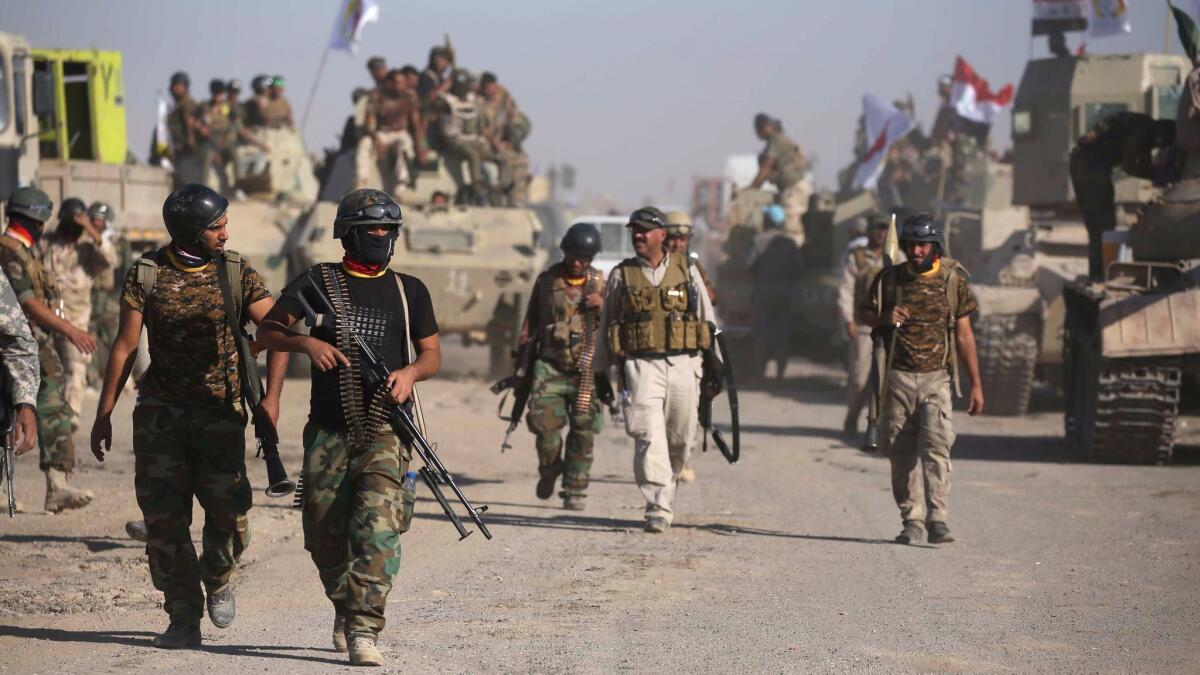Iraqi forces launch offensive that could cost Islamic State a strategic stronghold

Amman, Jordan — Fresh off their victory in Mosul, Iraqi forces Sunday launched their campaign to reclaim the city of Tall Afar, Islamic State’s last major bastion in the northern part of the country.
Its loss would deny the group a major resupply — or escape — route to the border with Syria, 60 miles to the west. The jihadis have long been able to cross the border with impunity.
Attired in the black uniform of Iraq’s special forces, Prime Minister Haider Abadi announced the operation, dubbed “We Are Coming, Tall Afar,” in a televised speech early Sunday.
“I say to you, Daesh, that you have no choice but to surrender or die, and as we promised before and promise now, we will continue the journey of liberation,” he said, addressing Islamic State’s fighters by an Arabic acronym considered a pejorative by the group’s supporters.
“We have been victorious in every battle we have fought during this journey, and the Daesh’s fate in every battle has been death and defeat,” he added.
Last month, Iraqi forces dealt a powerful blow against Islamic State in Mosul, the second-largest city in Iraq and the crown jewel of the group’s so-called caliphate. Yet the jihadis maintained a presence in several other areas of the country, including Tall Afar, a multiethnic city some 40 miles west of Mosul.
It fell to Islamic State during the group’s blitz campaign in mid-2014, transforming a city once hailed by President George W. Bush as a place where “one could see the outlines of the Iraq we’ve been fighting for” into an essential through-point linking Mosul to Raqqah, the group’s de facto Syrian capital.
Hours before the Sunday offensive began, Iraqi warplanes dropped leaflets over the city, exhorting citizens there to “prepare [them]selves … for the battle is nigh and victory is coming.”

Lt. Gen. Stephen Townsend, head of the U.S.-led coalition, issued a statement welcoming the launch of the offensive.
“The coalition is strong, and fully committed to supporting our Iraqi partners until ISIS is defeated and the Iraqi people are free,” he said.
The coalition statement added that “following their historic victory in Mosul, the [Iraqi security forces] have proven themselves a capable, formidable, and increasingly professional force, and they are well prepared to deliver another defeat to ISIS in Tall Afar.”
Islamic State is also known as ISIS or ISIL.
Later on Sunday, Iraqi military spokesman Brig. Gen. Yahya Rasool said in a statement to local media that Iraqi forces had launched a multi-pronged attack on the city and had already clawed back several nearby villages.
More than 30,000 people fled Tall Afar and its environs ahead of the offensive, said Lise Grande, the U.N.’s humanitarian coordinator in Iraq.
Though there are no clear population figures for the city (estimates range from 10,000 to 50,000, according to coalition planners), Grande expected thousands more would risk a 10- to 20-hour trek in scorching summer heat on their way to safety.
“We are deeply worried about the extreme risks that families are facing,” Grande said in a statement published online. She added that conditions were very tough in the city, which had been cut off on all sides by Iraqi forces since March.
“Food and water are running out,” said Grande, “and people lack the basic necessities to survive.”
The battle to take Tall Afar, where some 1,000 militants are bunkered, is not expected to be an easy one; Iraqi troops have yet to recover their strength in both men and materiel after the punishing nine-month campaign to take Mosul. (Baghdad has refrained from releasing casualty figures, but thousands of soldiers are thought to have been killed or wounded. Hundreds of vehicles were destroyed in the offensive.)
And although Tall Afar is significantly smaller than Mosul, it promises to be a more complex battlefield for Iraqi forces. Tall Afar’s ethnic makeup, once composed mostly of both Sunni and Shiite Turkmens, has already caused tensions between Iraq and its neighbors.
Turkey, which maintains a link with the city’s Turkmen population, a legacy from the Ottoman Empire, has vigorously objected to the participation of the Popular Mobilization Forces, also known as Hashd al Shaabi, an umbrella of mostly Shiite paramilitary factions whose loyalty is thought to lie with Iran. They have been accused in past government offensives of perpetrating sectarian-fueled vendettas against Sunni populations.
“Tall Afar is an entirely Turkmen town. If the Hashd al Shaabi starts terrorizing it, then our response will certainly be different,” said Turkish President Recep Tayyip Erdogan in a statement carried by the state-run Anadolu news agency in November.
Similar concerns had sidelined the Hashd from taking part in the campaign for Sunni-dominated Mosul. Yet the coalition’s statement Sunday appeared to accept the fait accompli of the Hashd’s presence among government forces fighting for Tall Afar. It was not clear if the coalition would provide the same close air support it has given to other branches of Iraq’s military.
Meanwhile, Hashd spokesman Ahmad Assadi heralded the militias’ larger role in a statement Sunday, saying that “the world will see the strength of the fighters in confronting the enemies of Allah and humanity.
“We will celebrate the victory for our people just as we celebrated it with their determination and will in the other battlefields.”
Bulos is a special correspondent.
Twitter: @nabihbulos
ALSO
Lebanese town looks for relief after three tough years tied to Syrian civil war
After Iran bans two soccer players for playing against Israelis, fans rush to their defense
State Department report on religious persecution accuses Islamic State of genocide
More to Read
Sign up for Essential California
The most important California stories and recommendations in your inbox every morning.
You may occasionally receive promotional content from the Los Angeles Times.











